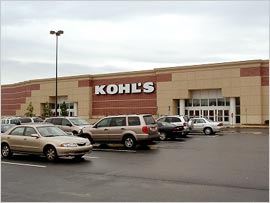
When it comes to shopping for clothes, consumers get what they want from Kohl’s: Solid customer service, good atmosphere, no-hassle
returns, prices they can live with, easy parking and dressing rooms that don’t give them nightmares. Nordstrom came in second in the survey from Market Force Information, a customer intelligence
firm, followed by Dillard’s and JC Penney.
What’s surprising, Janet Eden-Harris, Market Force’s CMO/SVP of Strategy, tells Marketing Daily, is just how solidly the
Wisconsin-based budget chain landed in first place. “It ranked highest in 9 of 11 categories,” she says. It’s the third year in a row that Kohl’s came in No. 1.
The
findings are based on responses from some 7,000 consumers, 80% of them women -- and results are then indexed to level the playing field between larger chains like Kohl’s and smaller ones
such as Nordstrom, which came in second. The much-swankier Nordstrom obviously didn’t do as well on price, she says, but came in solid second place in 8 categories.
advertisement
advertisement
Macy’s ranked
third, powered by women’s conviction that they can get specific designers there, and that it’s easy to buy an entire outfit in one store.
Dillard's, JCPenney, Coldwater Creek, Ann
Taylor LOFT, T.J. Maxx, Old Navy and Marshalls filled out the top 10. (Based on just the percentage of respondents naming a store as their favorite place for fashion, Kohl’s still earned the
most total votes, followed by JCPenney, Macy’s, Walmart and T.J. Maxx.)
“More than 70% of surveyed consumers said that they shopped most recently for casual clothing, with business
clothing coming in a distant second. That number grows to a 90% when we asked what they shopped for at their favorite retailer. That tells us that price and type of merchandise loom large as selection
criteria for a casual fashion retailer,” she says, adding that Kohl’s has that great balance of broad selection and good prices, particularly in the casual clothing sector.
One
surprise, she says, is how rapidly social media was changing women’s relationship with retailers. “Last year, when we asked how many had read an online post or blog about a specific store,
one in 10 said they had. This year, it was 37%. And 7% now say they have actually written a post about a store themselves.”
One sign that the economy is on consumers’ minds, she
says, is a decline in interest in Black Friday shopping, with just 68% of the survey saying they planned to shop that day -- down 6 percentage points. Conversely, 63% say they will shop on Cyber
Monday -- up 2%.